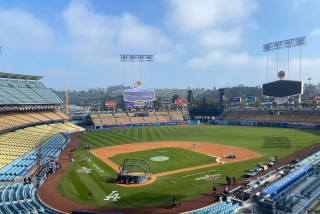Goldstar fills empty seats with paying audiences
On the wall in the Pasadena headquarters of the Goldstar ticket service is a concert poster from a decade ago, framed with the will call list showing the names of every Goldstar customer who bought tickets to the show.
Both of them. There were just two customers for the first event the fledgling ticket company offered, a dramatic contrast with the 3 million who are now Goldstar members.
Many of them are drawn by the 50% discount that Goldstar Events Inc. routinely offers on tickets to rock and pop concerts, plays, traveling circuses, Dodgers and Angels baseball games and other sporting and live entertainment events.
But Chief Executive Jim McCarthy insists that price is only one component of the Goldstar mission.
“Our goal has never been to sell half-price tickets,” McCarthy said recently. “The goal is to get people out to live entertainment more often, and we use price as one of the ways we enable them to do that.”
Goldstar entered the marketplace on Valentine’s Day 2002, the brainchild of McCarthy; Robert Graff, the chief technology officer; and Richard Webster, the chief financial officer and chief operating officer. The three are partners in the privately held firm, which has a second office in Portland, Ore.
All three had previously worked at the information technology provider Kiko Inc. McCarthy also spent time developing sales products for GeoCities before Yahoo Inc. acquired it in 1999. And Graff was director of production for GeoCities under the Yahoo leadership. Webster managed manufacturing, logistics and business development for a family-founded business that’s now part of Johnson & Johnson.
“For several years the three of us wanted to do a business our own way,” McCartney said. “We were friends and had worked at a lot of dot-com-boom companies that weren’t always using the best fundamental business practices. We took a lot of confirmation away from that in our own beliefs in the fundamentals of business — what makes a business viable and robust for a long time.”
“In the summer of 2001, we … started doing research into this concept,” McCarthy said. “We started thinking that tickets in live entertainment were absolutely perfect for the Internet, which would allow us to match people’s tastes with available events.”
Goldstar rooted its operation in a fundamental statistic of the live entertainment business: Roughly half of all available tickets to events go unsold each year.
“In the pre-Internet days, it would have been impossible to quickly notify 10,000 people over here about this event or 14,000 people over there about that event,” he said. “That’s what e-commerce is good at.”
By selling tickets that otherwise would go unsold, Goldstar delivers additional revenue to venues it has aligned itself with — about 5,000 sports arenas, theaters and clubs in 22 cities. Venues get 100% of the revenue from each ticket sold, and customers pay Goldstar a service fee of $1.50 to $5 per transaction.
That yielded gross revenue of about $70 million for Goldstar in 2011, up from what McCarthy said couldn’t have been more than $100,000 in the first year. Now he projects Goldstar’s gross revenue will hit $100 million to $125 million in 2013 if membership continues to grow 50% per year, as it has since 2002.
There are no authoritative figures for total numbers of tickets sold to live entertainment events or overall revenue generated, but Pollstar, a publication that tracks the live entertainment industry, reported that in 2011, the 100 top-grossing concert tours generated about $2.34 billion on sales of approximately 34.7 million tickets. Revenue was up 6.3% over 2010, but the quantity of tickets sold dropped more than 14% from the previous year.
Goldstar, which now employs a staff of 80, was a loner in the field when it began. But in 2008, Groupon Inc. began offering discounts on entertainment events as well as a variety of other services offered by regional merchants. And since Groupon arrived, social network sites offering daily bargains have exploded, with LivingSocial Inc., Dealfind, Tippr, Amazon.com Inc.’s AmazonLocal and a plethora of others.
McCarthy and his partners don’t see these as direct competitors.
“We’re not trying to compete with cheap oil changes, laser dermabrasion or toenail removal,” he said. “Groupon and LivingSocial are doing very well. But nobody else has done what we’ve done, which is to create an overall platform where, from the consumer’s point of view, you can go to our site and find something to do that’s high quality just about any time.”
Goldstar pours significant resources into its event descriptions, striving to inform and educate its members about worthwhile events. A prime example of how price isn’t the alpha and omega of Goldstar’s operation is its alliance with Independent Shakespeare Co., which stages the Bard’s plays in Griffith Park every summer.
The performances are free, yet for each show, dozens of Goldstar members still pay a service fee to get tickets through Goldstar, in part because a special seating area is reserved for those who do.
“It’s very interesting to see the comments people leave on our page at Goldstar,” said David Melville, the Shakespeare company’s managing director. “Quite a lot of them are telling each other they didn’t need to book the ticket on Goldstar. But it was on Goldstar that they found out about us. The benefit for us is they have this enormous email base, something like 300,000 people in the area here. We couldn’t buy advertising like that.”
MORE:
INTERACTIVE: TVs highest paid starts
PHOTOS: Hollywood back lot moments
More to Read
From the Oscars to the Emmys.
Get the Envelope newsletter for exclusive awards season coverage, behind-the-scenes stories from the Envelope podcast and columnist Glenn Whipp’s must-read analysis.
You may occasionally receive promotional content from the Los Angeles Times.






